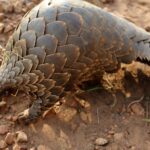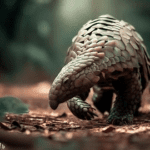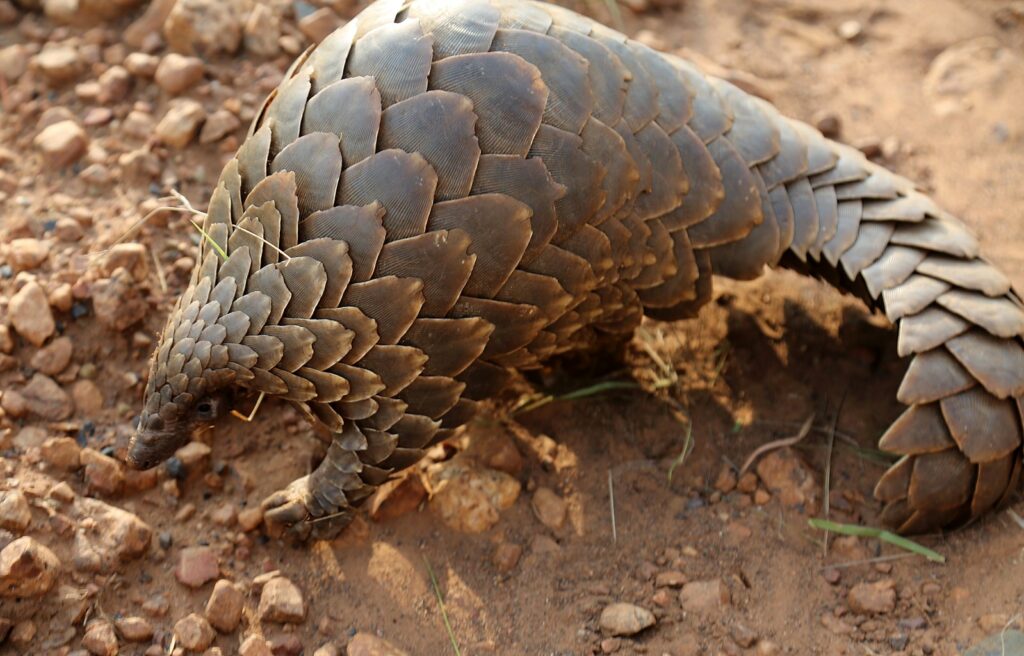
Image: Pangolin Wikimedia CommonsCC By 2.0
Pangolins, often known as “living pinecones,” possess an extraordinary defense mechanism that has baffled researchers for years. Their armor, made of hard keratin scales, can even repel attacks from large predators like lions and tigers!
But it’s not only their physical attributes that keep them safe. When danger approaches, pangolins roll themselves into a tight ball, with their scales shielding them from harm. This clever strategy minimizes vulnerable areas and helps them escape unharmed.
Surprisingly, pangolin scales are also antibacterial, protecting them from infections and helping wounds heal faster than other mammals.
It’s clear that pangolins are a captivating species, pampered by Mother Nature’s handiwork. They truly embody survival at its finest – a testament to life’s unwavering resilience even in seemingly impossible circumstances. So, what is a pangolin? Think a miniature armored tank with a really bad manicure!
Key Takeaways
- Pangolins are not bulletproof, despite their tough scales.
- The scales of pangolins are made of keratin, the same material found in human hair and nails.
- While the scales provide some protection against predators, they are not strong enough to withstand bullets.
- Pangolins are highly endangered due to illegal hunting and trafficking for their scales, meat, and body parts.
- Conservation efforts are crucial to protect pangolins and prevent their extinction.
What is a pangolin?
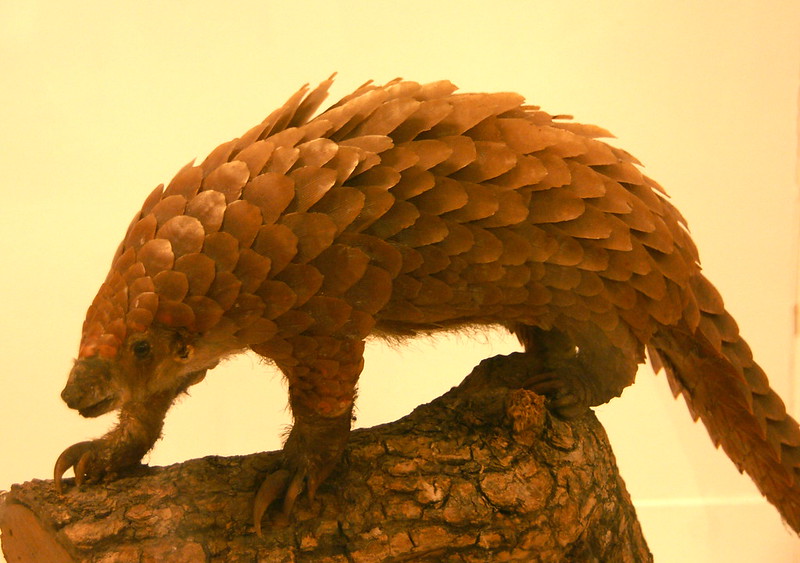
Image: Pangolin Flickr CC 2.0
Pangolins are unique mammals found in Africa and Asia. They have an armor made of keratin scales, which is the only one of its kind among mammals. These scales act as a shield protecting the pangolin from predators.
Long snouts and sticky tongues give them the ability to catch ants and termites, their main food source. Pangolins are nocturnal and like the solitude of living alone. Their powerful claws help them dig burrows where they hide during the day.
If threatened, they can curl up into a tight ball, looking like an armored artichoke or a pinecone. Nature has gifted these animals with incredible traits for survival.
In addition, pangolins are essential for their ecosystems. They control insect populations naturally by consuming vast amounts of ants and termites. This helps keep balance in the animal kingdom.
A remarkable story happened in 2019. An anti-poaching team in Africa rescued a critically endangered pangolin from illegal traders, who had smuggled it inside a suitcase to sell on the black market.
Thankfully, the pangolin was saved and rehabilitated at a wildlife rescue center before being released back into its natural habitat. This reminder shows us how vital it is to protect these animals and conserve biodiversity for future generations.
Sure, the pangolin’s armor appears impenetrable, but if faced with a bullet they would crumple like an accordion. So, it’s more like a stylish accessory than an invincible shield.
The misconception of pangolins being bulletproof
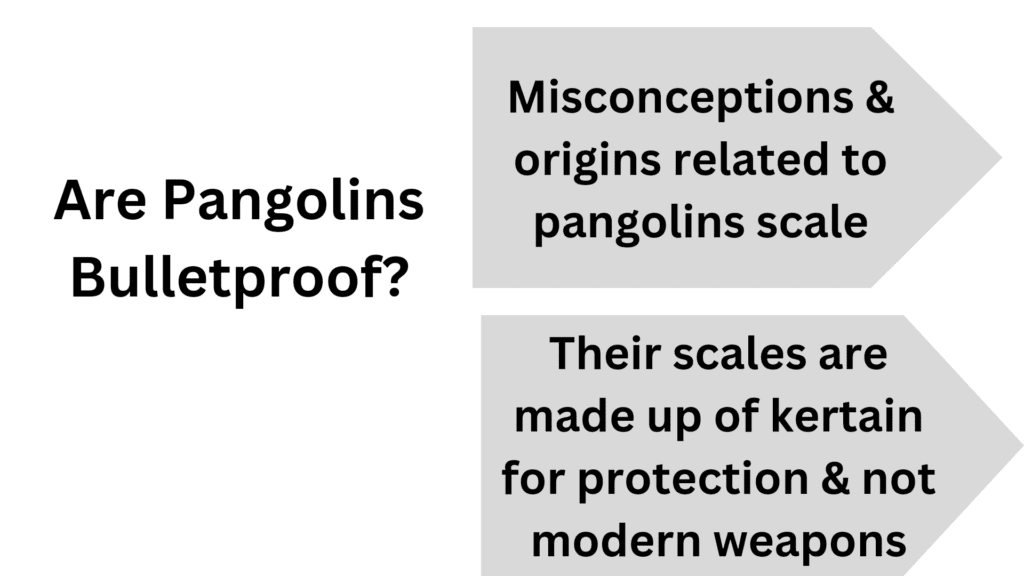
Pangolins: Debunking the Myth of Bulletproof Armor
Pangolins have long been surrounded by the misconception that their scales make them impervious to bullets. However, this notion is far from the truth. While their scales are indeed tough and act as a form of defense against predators, they do not provide complete protection against bullets.
Contrary to popular belief, pangolins are not bulletproof. Their scales, made of keratin, the same material found in human hair and nails, are effective in shielding them against most natural threats, such as claws and teeth. These scales are highly durable and can withstand significant pressure, but they do not possess the ability to repel bullets.
It is important to dispel such misconceptions as they can contribute to the illegal poaching and trade of pangolins for their scales, which are highly sought after in traditional medicine and as a luxury item. The demand for pangolin scales has led to a significant decline in their population, making them one of the most trafficked mammals in the world.
Pangolins are fascinating creatures with unique adaptations. For example, when threatened, they can curl up into a tight ball, with their scales acting as a shield. Additionally, their long tongues allow them to probe deep into ant hills and termite mounds to feed on insects, their primary source of nutrition.
True fact: According to the International Union for Conservation of Nature (IUCN), all eight species of pangolins are now listed as either vulnerable or critically endangered. It is crucial to raise awareness and implement strict conservation measures to protect these remarkable and vulnerable creatures.
Pangolins may be armored, but bulletproof? I thought this was a science article, not a superhero movie.
Origins of the myth
The myth of pangolins being bulletproof has its roots in ancient folklore. Stories of their impenetrable scales captivated people and spread across cultures. It’s essential to debunk this misconception and reveal the truth about these remarkable creatures.
Their scales, made of keratin, protect them from predators like lions and tigers. But, when faced with firearms, these scales can’t stop modern weapons.
This myth has caused pangolins to be hunted relentlessly for their scales, which fetch high prices in black markets. To show the devastation this myth brings, consider the story of Kai, a young pangolin rescued from a poacher’s den. He was shot at close range, even though his armor-like body covering saved him from the initial attack.
We must confront these misconceptions and understand the reality facing pangolins. By dispelling myths and raising awareness of their vulnerability, we can conserve these incredible creatures for generations.
Exposing the truth: Myth debunked
Pangolins are often misunderstood, with the myth that they possess impenetrable armor being debunked. They are native to Africa and Asia and some have described them as “living armored tanks”. However, their scales are not bulletproof. They are made of keratin, which is the same material found in human nails and hair.
These unique creatures face huge threats from both nature and humans. Illegal wildlife trade has caused poachers to target them, leading to devastating consequences for their populations. The IUCN states that they are now the most trafficked mammals in the world.
It is important to understand the reality of pangolin’s nature and vulnerabilities, so we can work towards protecting them. Increased law enforcement and public awareness campaigns are vital to conserve these extraordinary creatures and ensure their habitats are preserved.
The true secret weapon of pangolins is their natural bulletproof couture, sure to make any fashionista green with envy!
The physical characteristics and defense mechanisms of pangolins
Marvelous pangolins! Let’s dive into their world and discover their uniqueness. Their bodies are built for strength and grace, protected by overlapping armor-like scales. Claws give them the power to dig through different terrains. With elongated snouts and tongues, they can feed on ants and termites. When threatened, they can curl up into a tight ball, camouflaging and shielding their vulnerable underbelly.
We have only begun to unravel their secrets! Join us on this journey to understand and appreciate these remarkable creatures. Help us to preserve them for future generations to cherish. Don’t miss out on this amazing mission!
The importance of pangolins and their conservation status
Pangolins hold a special place in the animal kingdom. They are known as “nature’s pest control” for their ability to eat ants and termites, preventing infestations. Plus, they help spread seeds, aiding reforestation. But, unfortunately, all eight pangolin species are threatened or critically endangered due to their illegal trade for meat and scales.
These amazing animals have sharp claws, perfect for digging burrows and climbing trees. Their powerful sense of smell helps them locate ant nests. Plus, their protective scales act as a shield against predators. But, sadly, they still fall victim to poaching and habitat loss.
Pangolins are essential for ecosystem health. As insectivores, they keep insect populations under control. Without them, pollination and agriculture could be disrupted.
Here’s a pro tip: support organizations dedicated to pangolin conservation and educate others about their importance. It could make a big difference for these vulnerable creatures.
Frequently Asked Questions
1. Can pangolins withstand bullets?
No, pangolins are not bulletproof. Despite having scales made of keratin, which is the same material found in human fingernails, pangolins are not able to withstand bullets.
2. Why are pangolins often associated with being bulletproof?
Pangolins are often associated with being bulletproof due to their unique physical appearance. Their tough and armor-like scales give the impression that they can protect themselves from various threats, including bullets. However, this is a misconception.
3. Can pangolin scales be used to make bulletproof vests?
No, pangolin scales cannot be used to make bulletproof vests. While pangolin scales are durable and tough, they lack the necessary properties to provide effective protection against bullets. Modern bulletproof vests are composed of specialized materials designed to absorb and disperse the impact of bullets.
4. Are pangolins resistant to any kind of damage?
No, pangolins are not completely resistant to damage. While their scales offer some protection against natural predators, such as lions and hyenas, they are not invincible. Pangolins can still be harmed by various means, including trapping and poaching.
5. Are there any animals that are bulletproof?
No, there are no known animals that are bulletproof. While certain animals may have adaptations that provide protection against specific threats, none of them have been found to possess the ability to withstand bullets. Bullets are designed to penetrate and inflict damage upon impact.
6. How can we protect pangolins?
We can protect pangolins by raising awareness about the threats they face, supporting conservation efforts, and combating illegal wildlife trafficking. Pangolins are highly endangered due to habitat loss and poaching, primarily driven by the demand for their scales and meat.
Conclusion
Pangolins have long been known for their remarkable defense mechanisms. Tough scales give them natural armor-like protection. But, contrary to popular belief, they are not bulletproof.
These creatures can curl up into a ball and rely on their strong scales to protect them from predators like lions and tigers. Bullets, however, easily pierce through these scales, causing fatal injuries.
Pangolins are therefore vulnerable to illegal hunting and poaching. In Southeast Asia, where they are hunted for their meat and scales, conservation efforts have been put in place. Ah Meng was a rescued pangolin who became an ambassador for his species. His story has raised awareness about the importance of preserving pangolin populations.
References

